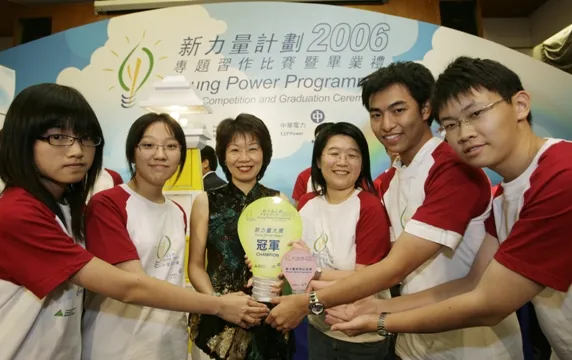
CLP promotes low-carbon living among youth
Ten shortlisted teams of secondary students presented their achievements of promoting low carbon living for CLP’s “Young Power Award”.
This is made possible by the CLP Young Power Programme, a youth leadership development programme jointly organised by CLP and Junior Achievement Hong Kong. It offers students an opportunity to understand the power industry and how they can contribute to a better and sustainable future.
The Programme received an overwhelming response this year with 42 participating teams. The best ten were selected to go through a series of activity-based thematic learning in the past four weeks, which included student mentorship and leadership-training activities, developing their creativity, teamwork, leadership skills, and sense of social responsibility.
“CLP is pleased to offer an exceptional experience for young leaders to understand how a responsible power company can contribute to sustainable development. I hope all participants will put this knowledge to good use and lead us towards a low carbon future,” said Mr Richard Lancaster, Managing Director- CLP Power of CLP Power Hong Kong.
Building on this year’s theme – “Towards a Low Carbon Future”, the shortlisted teams also have to interpret what they have learnt into creative ideas to engage the community in low carbon living. In the grand finale, the teams competed for “Best Booth in the Eyes of the Audience” and Young Power Awards.
The winning teams of Young Power Programme 2010 are:
- Young Power Award Champion: St Catharine's School For Girls, Kwun Tong
- Young Power Award First runner-up: Valtorta College
- Young Power Award Second runner-up: SALEM-Immanuel Lutheran College
- Best Booth in the Eyes of the Audience: St Stephen's Girls' College
Ms Vivian Lau, Chief Executive Officer of Junior Achievement Hong Kong said, “Some ideas put forward by the student teams are inspiring and have actually called out to people to live a low carbon life. Junior Achievement Hong Kong is honored to partner with CLP for the seventh consecutive year in developing future green leaders.”
Since 2009, CLP’s Young Power Programme has extended its reach to Chinese Mainland and India to nurture more local young leaders in the areas where CLP operates. The Young Power Awards champion teams from both locations will join the Hong Kong champion team for a 10-day cultural and learning experiences during which they will be visiting CLP’s biomass and wind farm facilities in Shandong . They will also be engaged with students from the Tsinghua University in academic exchange on low-carbon future of the power sector.













 Advertise
Advertise











